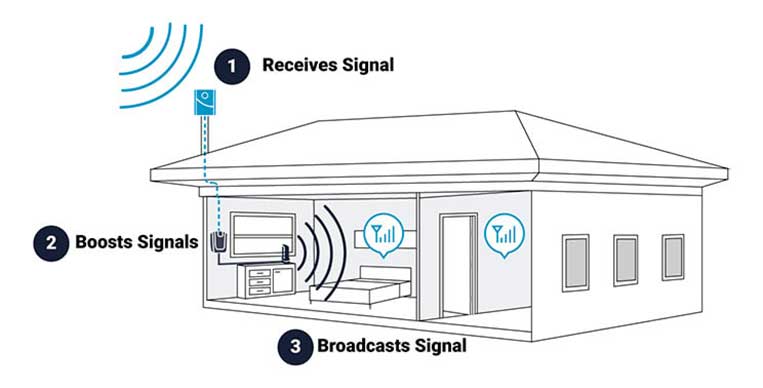Find the Right Signal Booster for You
Answer a few questions and we'll recommend the best solution to solve your cell signal problems.
Answer a few questions and we'll recommend the best solution to solve your cell signal problems.
If you struggle with reliable cell phone reception inside your home, office, or while on the go, you've probably heard of cell phone signal boosters.They're also known as cellular amplifiers or repeaters.
But how do they work? And do they actually work? We have the answers!
Take advantage of our system design and installation services. Learn more or call us for a free consultation: 1-800-969-8189.
A cell phone signal booster is a device designed to enhance cellular signal and improve connectivity and coverage. The frequency of dropped calls, failed texts, and slow data significantly reduce or end. They are available for homes, offices, commercial spaces, and vehicles.
Cell phone booster systems take your outside cellular signal (even if weak) and deliver it even stronger indoors, allowing mobile devices to have better reception for both inbound and outbound communications. They do this in three simple steps:

Cellular boosters use existing cellular signals to work, they do not create cellular signals. A donor antenna, ideally installed on the roof, captures available LTE, 4G, and 5G signals from nearby towers.
There are two types of outdoor antennas:
The amplifier, also called the booster, does the legwork. It receives the captured cellular signals via coaxial cable and amplifies them.
There are two types of amplifiers:
Whether signal carrier or multi-carrier, amplification power, reach, and coverage capabilities vary by unit.
Amplifiers with a higher gain offer a stronger boost. Those with a higher uplink power enable greater transmission to cell towers. These specifications are extremely helpful for areas with weak cell signals. Boosters with a higher downlink power can provide greater coverage.
The inside antenna receives the boosted signals from the amplifier via coaxial cable and rebroadcasts them in your home, office, or vehicle. All cellular devices within the coverage area will automatically receive improved cellular reception for voice, text, and data.
Home and office units commonly use:
Vehicle units, on the other hand, commonly use:
Absolutely!
As long as you have a sliver of cellular signal outside, cell signal boosters work.
There are a lot of tests and reviews out there proving that they really do work. Here are some examples:
TheFitRV put a Drive X RV to the test in a desert. Download speed improved by 24.3 times and upload speeds by 6.25 times.

Engagement saw great results from the Drive Reach in the mountains. Bars increased from 1 to 3 and download speeds skyrocketed from 2 Mbps to 24 Mbps.

The Antenna Man tested the HiBoost 10K Smart Link. The unit added three bars and quadruple download speeds once turned on.

The only time a signal booster will not work is when you're in a total dead zone.
Check out our case studies for more success stories.
There are a lot of junk boosters out in the market. So, it only makes sense to be skeptical about their legitimacy. All of our boosters are approved by the Federal Communications Commission (FCC), ensuring they work as claimed.
Here are some of the most popular cell phone boosters that actually work:
A cell phone booster is ideal when:
Those approved by the FCC, like ours, are 100% legal. They've set up guidelines for signal boosters that must be followed to prevent harmful interference with cellular networks.
The benefits of a cell booster include:
No, signal boosters do not need an internet connection to work. They just need electrical power and existing signal.
Cell phone signal boosters are not designed to work outdoors. They are meant to improve indoor cellular reception and coverage. If used outdoors, they can cause harmful interference with nearby cell phone towers.
Yes. As long as there is a sliver of cellular signal, a signal booster will work in rural and remote areas. Depending on how far your closest cell tower is, a more powerful antenna may be needed to improve range.
For more information, visit Cell Phone Boosters for Rural Areas.
Yes. Using coaxial cable, signal boosters are able to bypass metal walls and roofs keeping cell signal out.
All of our signal boosters are 5G ready and will boost any 5G signals operating on the supported frequency bands.
Signal Boosters we specialize in providing top-quality cellular signal boosters tailored to your specific needs. Give us a call at 1-800-470-6777 or email us at sales@signalboosters.com to turn your signal woes into signal wows.
Interested in Learning More? Check Out Our Cellular Info Hub / WiFi Info Hub








